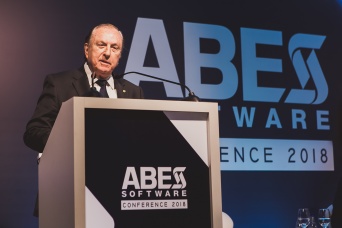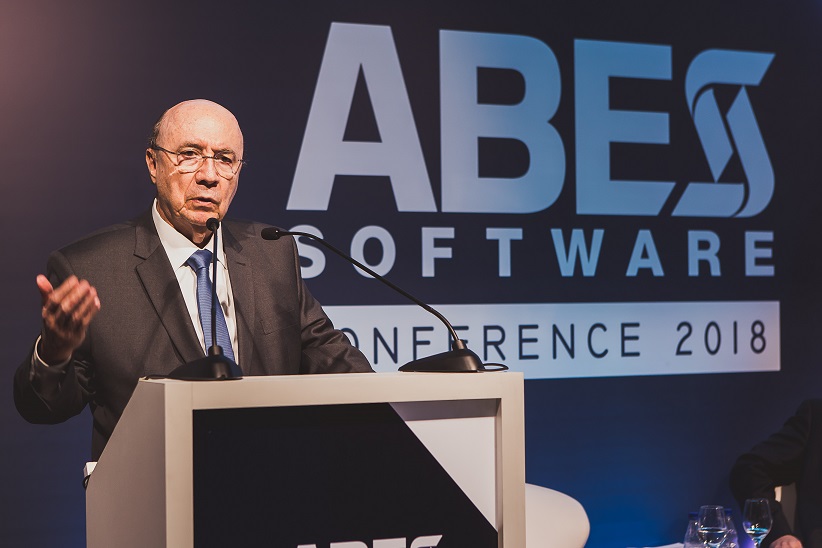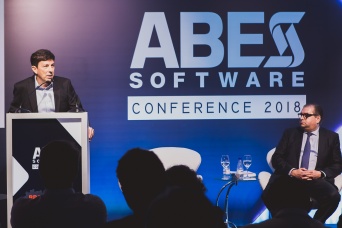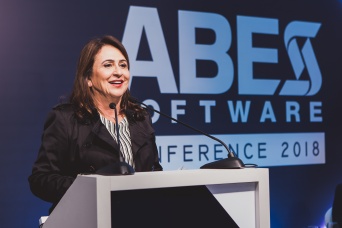After the 8th edition of the ABES SOFTWARE CONFERENCE, on August 20, 2018, in São Paulo, ABES promoted the Seminar Brasil 2022 – “Bicentenary of Independence: Independence (Digital) or Death (Competitive)”, to which all candidates for the Presidency of the Republic were invited, they would have 20 minutes to talk about their government plans for digital transformation. Attending the seminar were Henrique Meirelles (MDB), José Maria Eymael (DC), João Amoêdo (Novo) and Kátia Abreu (PDT – deputy to Ciro Gomes). The initiative was supported by ACATE, ASSESPRO, BRASSCOM, FENAINFO and SOFTEX.
A study was presented at the event “Brazil in the digital era: a contribution from the software and technology sector to the digital transformation of Brazil”, prepared by Think Tank Brasil 2022, composed of some of the most influential names in the IT sector and ABES executives. O document provides indications of priorities and public policies, suggested for Brazil to achieve its “Digital Independence” as early as 2022, the year that marks the 200 years of the country’s Independence. Applicants received a copy of the executive summary of the study, as did everyone who attended the conference and seminar.
A brief opening was given by Francisco Camargo, president of ABES, in which he stressed that the digital divide is very big. “Brazil is in a hurry. The country cannot be too late, as it would be difficult to catch up later. We need planning, public policies that are perennial and permanent, that are not just from a government, but state policies”, he highlighted.
Study and proposals
Vanda Scartezini, entrepreneur, ABES advisor and Think Tank coordinator, was responsible for discussing the study. “What we focused on in this multidisciplinary study were objective actions, viable to be implemented in a management. We created four important goals and a zero proposal focused on the need for planning and coordination”.
In all proposals, short-term actions were indicated, which can be put into practice in the first year of government, and medium-term actions. The first deals with education and training; the second is aimed at seeking legal certainty and simplification; the third on fostering innovation, attracting investment and strengthening startups; and, as a fourth proposal, the business strengthening of the software and services sector, including with a view to internationalization. An online PDF version of the executive summary, with key actions, is available for download.
Goals of future governments
Below, we highlight the main points presented by the presidential candidates at the seminar, who should answer at least three questions previously sent to the candidates' teams, focusing on the following pillars: innovation, digital transformation and business environments, considered vital for the software and technology sector.




The senator candidate for vice president of Ciro Gomes (PDT) emphasized that the presidential candidate's government plan foresees placing technology as the basis of business and education. “It is necessary to put an end to prejudice and reduce the distance between the market, the academy and universities for the best in the country”, he said. Kátia Abreu used the example of agribusiness development through investment in research and technology to demonstrate that it is possible to take a big leap towards the digital economy in Brazil. He cited the example of China's special economic zones as an interesting model for Brazil to accelerate digital transformation and integration into global value chains.
About Think Tank Brasil 2022
Created by ABES, it is formed by some of the most influential names in the IT sector: Dr. Deana Weikersheimer; professor at FGV and lawyer with extensive experience in the software area; Dr. Dorothea Werneck, former Minister of Industry and Commerce and Labour; Marcelo Pagotti, former secretary of SETIC at the Ministry of Planning; Patricia Pessi, former Director of Electronic Government at SLTI (today SETIC) of the Ministry of Planning; Rodolfo Fucher, former Director of Public Policy at Microsoft; and Vanda Scartezini, engineer and adviser to ABES, former Secretary of Information Technology Policy [SEPIN, current SEPOD] of MCTIC and former Secretary of Industrial Technology [STI] of MDIC.














